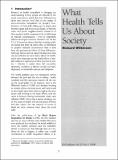| dc.contributor.author | Wilkinson, Richard | en |
| dc.date.accessioned | 2016-02-24T15:14:08Z | |
| dc.date.available | 2016-02-24T15:14:08Z | |
| dc.date.issued | 01/01/1998 | en |
| dc.identifier.citation | Wilkinson, R. (1998) What Health Tells Us About Society. IDS Bulletin 29(1): 77-85 | en |
| dc.identifier.issn | 1759-5436 | en |
| dc.identifier.uri | https://opendocs.ids.ac.uk/opendocs/handle/20.500.12413/9177 | |
| dc.description.abstract | Summary Richard Wilkinson summarises the argument of his recent book Unhealthy Societies: The Afflictions of Inequality (Routledge, 1996). Social class differences in health show how sensitive health remains to the social and economic environment, even in developed countries. But health is affected less by absolute income levels and the differences in material standards themselves than by relative income and the psychosocial implications of the economic and social status differences. There is now a substantial body of evidence to show that average life expectancy is highest not in the richest of the developed countries but in those where income differentials are smallest ? that is, where the burden of relative deprivation is smallest. As we come to understand these links, just as important as what society tells us about health is what health tells us about society. Death rates seem to be highly sensitive to the psychosocial welfare of populations. | en |
| dc.format.extent | 9 | en |
| dc.publisher | Institute of Development Studies | en |
| dc.relation.ispartofseries | IDS Bulletin Vol. 29 Nos. 1 | en |
| dc.rights.uri | http://www.ids.ac.uk/files/dmfile/IDSOpenDocsStandardTermsOfUse.pdf | en |
| dc.title | What Health Tells Us About Society | en |
| dc.type | Article | en |
| dc.rights.holder | © 1998 Institue of Development Studies | en |
| dc.identifier.doi | 10.1111/j.1759-5436.1998.mp29001009.x | en |

